#I HAVE WANTED TO TALK ABOUT BALFOUR FOR SO LONG
Explore tagged Tumblr posts
Text
I remembered this essay from years ago when I was unlearning what I knew of Israel and zionism and I couldn't find it again, and now I see it in a Shaun video, with the source.
Ze'ev Jabotinsky, "The Iron Wall." I downloaded it from the Jabotinsky Institute.
These are the titles he gave this essay:

I said that Zionist leaders explicitly talked about Zionism as a colonialist movement. This is an example of what I was talking about.
Some quotes:
There can be no voluntary agreement between ourselves and the Palestine Arabs. Not now, nor in the prospective future. I say this with such conviction, not because I want to hurt the moderate Zionists. I do not believe that they will be hurt. Except for those who were born blind, they realised long ago that it is utterly impossible to obtain the voluntary consent of the Palestine Arabs for converting "Palestine" from an Arab country into a country with a Jewish majority.
My readers have a general idea of the history of colonisation in other countries. I suggest that they consider all the precedents with which they are acquainted, and see whether there is one solitary instance of any colonisation being carried on with the consent of the native population. There is no such precedent.
He's saying openly: no land was colonized with the consent of its indigenous population. So we have to do it without that consent.
Every native population in the world resists colonists as long as it has the slightest hope of being able to rid itself of the danger of being colonised.
That is what the Arabs in Palestine are doing, and what they will persist in doing as long as there remains a solitary spark of hope that they will be able to prevent the transformation of "Palestine" into the "Land of Israel."
He said that any zionist who depends on the Arab population accepting a Jewish state on their lands, might as well withdraw from zionism because that's impossible.
Zionist colonisation must either stop, or else proceed regardless of the native population. Which means that it can proceed and develop only under the protection of a power that is independent of the native population – behind an iron wall, which the native population cannot breach.
And then he says that this Iron Wall is the British Mandate and the Balfour Declaration - they're the power that stops Palestinians from resisting us.
He says that despite this, zionism is moral and just, so justice must be done, zionism must move forward. He just wants to be honest about what it takes. He wants to discourage talks of an agreement to avoid signaling to the British that they must try to reach one between us and Palestinians. Just stop them from fighting us, we'll colonize the place.
Zionism was openly colonialist until this language was no longer politically useful.
Editing because I was kinda shocked by the response this got, in several moments. When the slavery of US founders was brought up to dismiss this whole thing. When First Nations reservations were brought up on the same list as the United States as equivalent to Israel, because I said I oppose the existence of a country that prioritizes one ethnic group at the expense of others, and I support democracy that protects everyone equally.
But another thing that's still nagging at me is the idea that this whole essay can be dismissed based on semantic arguments, like sure this uses the word colonialism, but is it actually the colonialism that we talk about and oppose? And what if this word is only used to appeal to the British for support?
This isn't the the first time that prominent zionist thinkers talk about zionism as a colonialist movement. I saw it in old publications, things like magazines, I'd be posting them too if I found them again. I did my own deconstructing years ago, I don't remember where I found all my sources.
I do remember that they talked about the two concepts together - the idea that we're here to colonize, and that we're here to come home. So nowadays there's the arguement that people can't colonize their own homeland, but to them there was no contradiction. I saw it again looking at Herzl's diary last night.
I say I define colonialism through actions and tactics, through the harm that's done to the victims of colonization. Because if we knowingly repeated the actions of colonizers and used the help of an imperial force to conquer a land, having a historic connection to it shouldn't absolve us.
Jabotinsky didn't write to the British in this essay. He wrote to other zionists who wanted to aim for something more collaborative with Palestinian Arabs. And it's true that word choice can mean different things in the context of the time, but there's a reason I chose those quotes. What is he actually saying in this essay?
Consider colonization throughout history - the native population never agreed, so we must do the as colonizers did in the past.
Palestinians will never agree to a Jewish state - so we must do it by force. We should use an imperial force as an "iron wall" to prevent them from resisting. Stop talking about an agreement because then the British will try to reach one instead of holding them back and letting us do our thing.
He's comparing the zionist movement to other efforts of colonization, to talk about emulating them.
This isn't a game of semantics. I'm not just bringing this up just because he used the words.
What he's describing - conquest by force, preventing a Palestinian state, forcibly creating a Jewish majority - is what happened. And it's still what's happening.
This is the branch of zionism that went into practice and founded Israel.
2K notes
·
View notes
Note
I’m wondering if you have thoughts on James Baldwin’s “open letter to the born again”? I’m struggling a bit with what his point is in that piece; it feels kinda dismissive on Jewish zionists agency in creation of Israel? But I may be missing parts or not getting things
The text in question.
And the segment I think anon is struggling with:
I know what I am talking about: my grandfather never got the promised “forty acres, and a mule,” the Indians who survived that holocaust are either on reservations or dying in the streets, and not a single treaty between the United States and the Indian was ever honored. That is quite a record.
Jews and Palestinians know of broken promises. From the time of the Balfour Declaration (during World War I) Palestine was under five British mandates, and England promised the land back and forth to the Arabs or the Jews, depending on which horse seemed to be in the lead. The Zionists—as distinguished from the people known as Jews—using, as someone put it, the “available political machinery,’’ i.e., colonialism, e.g., the British Empire—promised the British that, if the territory were given to them, the British Empire would be safe forever.
But absolutely no one cared about the Jews, and it is worth observing that non-Jewish Zionists are very frequently anti-Semitic. The white Americans responsible for sending black slaves to Liberia (where they are still slaving for the Firestone Rubber Plantation) did not do this to set them free. They despised them, and they wanted to get rid of them. Lincoln’s intention was not to “free” the slaves but to “destabilize” the Confederate Government by giving their slaves reason to “defect.” The Emancipation Proclamation freed, precisely, those slaves who were not under the authority of the President of what could not yet be insured as a Union.
It has always astounded me that no one appears to be able to make the connection between Franco’s Spain, for example, and the Spanish Inquisition; the role of the Christian church or—to be brutally precise, the Catholic Church—in the history of Europe, and the fate of the Jews; and the role of the Jews in Christendom and the discovery of America. For the discovery of America coincided with the Inquisition, and the expulsion of the Jews from Spain. Does no one see the connection between The Merchant of Venice and The Pawnbroker? In both of these works, as though no time had passed, the Jew is portrayed as doing the Christian’s usurious dirty work. The first white man I ever saw was the Jewish manager who arrived to collect the rent, and he collected the rent because he did not own the building. I never, in fact, saw any of the people who owned any of the buildings in which we scrubbed and suffered for so long, until I was a grown man and famous. None of them were Jews.
And I was not stupid: the grocer and the druggist were Jews, for example, and they were very very nice to me, and to us. The cops were white. The city was white. The threat was white, and God was white, Not for even a single split second in my life did the despicable, utterly cowardly accusation that “the Jews killed Christ’’ reverberate. I knew a murderer when I saw one, and the people who were trying to kilI me were not Jews.
But the state of Israel was not created for the salvation of the Jews; it was created for the salvation of the Western interests. This is what is becoming clear (I must say that it was always clear to me). The Palestinians have been paying for the British colonial policy of “divide and rule” and for Europe’s guilty Christian conscience for more than thirty years.
Finally: there is absolutely—repeat: absolutely—no hope of establishing peace in what Europe so arrogantly calls the Middle East (how in the world would Europe know? having so dismally failed to find a passage to India) without dealing with the Palestinians. The collapse of the Shah of Iran not only revealed the depth of the pious Carter’s concern for “human rights,” it also revealed who supplied oil to Israel, and to whom Israel supplied arms. It happened to be, to spell it out, white South Africa.
Well. The Jew, in America, is a white man. He has to be, since I am a black man, and, as he supposes, his only protection against the fate which drove him to America. But he is still doing the Christian’s dirty work, and black men know it.
My friend, Mr. Andrew Young, out of tremendous love and courage, and with a silent, irreproachable, indescribable nobility, has attempted to ward off a holocaust, and I proclaim him a hero, betrayed by cowards.
For context: Andrew Young, considered the right hand of MLK Jr, had a longstanding and occasionally fraught relationship with the Jewish community. He stepped down from Congress shortly after being forced to choose between voicing support for Palestine and continuing to work towards black-jewish interests by his constituents and fellow politicians, as he felt very strongly about supporting both. This was a fairly unpopular move. While I don't believe he ever called himself Jewish by the strictest sense, he was actively involved in Jewish communities and the known "white" ancestry within him is a Polish Jew in his great grandparents.
To be honest, I don't really see much a problem with this as I think it fairly closely matches up not only with my understanding of the history of this problem but also my own country's part in it as well as my personal feelings on it decades later. It pretty blatantly says that Zionism is utilizing a machination of white supremist colonism due to the extensive history of antisemitism and having had the ancestral land dangled in front of them like bait on a hook from the British Empire, which owned Palestine at the time. It also goes on to say that many Zionists aren't even Jewish and are antisemitic in nature, but are Christians happy to get rid of as many Jews as possible and how that tracks due to the Christian church's millennia-deep history of antisemitism.
I don't think it lets anyone off the hook. I think it pretty much flat out says this is a problem caused first and foremost by white Christians who hate Jews and Arabs alike and have a vested interest in getting the two populations to fight because it'll be easier to kill off just the one group instead of both of them, if one ends up eradicating the other. It even talks about the friction between the black community and the Jewish community, what caused it, what drives it, how that friction in itself is a tool of white supremacy to hurt us both.
238 notes
·
View notes
Text
Read this again today for the first time in a year and it's still one of the best pieces I've read on this topic.
It is long, but I urge you to read it.
(Pasted here unedited so nobody needs to visit Musk's platform, formerly known as Twitter.)
Isaac Saul
11:26 AM · Oct 10, 2023
People ask me all the time if I am "pro-Israel" because I am a Jew who has lived in Israel, and my answer is that being "pro-Israel" or being "pro-Palestine" or being a "Zionist" does not properly capture the nuance of thought most people do or should have about this issue. It certainly doesn't capture mine.
I have a lot to say. I’ve spent the last 72 hours writing, texting, and talking to Israelis, Jews, Muslims, and Palestinians. Much of my reaction is going to piss off people on "both sides," but I am exhausted and hurting and I do not think there is any way to discuss this situation without being radically honest about my views. So I'm going to try to say what I believe to be true the best I can.
Let me start with this: It could have been me.
That's a hard thought to shake when watching the videos out of Israel — the concert goers fleeing across an empty expanse, the hostages being paraded through the streets, the people shot in the head at bus stops or in their cars. I went to those parties in the desert, I rubbed shoulders with Israelis and Arabs and Jews and Muslims, I could have easily accepted an invitation to some concert near Sderot and gone without a care, only to be indiscriminately slaughtered. Or, perhaps worse, taken hostage and tortured.
I don’t believe Hamas is killing Israelis to liberate themselves, nor do I believe they are doing it to make peace. They're doing this because they represent the devil on the shoulder of every oppressed Palestinian who has lost someone in this conflict. They're doing it because they want vengeance. They are evening the score, and acting on the worst of our human impulses, to respond to blood with blood — an inclination that is easy to give in to after what their people have endured. It should not be hard to understand their logic — it is only hard to accept that humans are capable of being driven to this. Not defending Hamas is a very low bar to clear. Please clear it.
It’s not possible to recap the entire 5,000 year history of people fighting over this strip of land in one newsletter. There are plenty of easily accessible places you can learn about it if you want to (and, by the way, many of you should — far too many people speak on this issue with an obscene amount of ignorance, loads of arrogance, and a narrow historical lens focused on the last few decades). But I'll briefly highlight a few things that are important to me.
In my opinion, the Jewish people have a legitimate historical claim to the land of Israel. Jews had already been expelled and returned and expelled again a half dozen times before the rise of the Muslim and Arab rule of the Ottoman Empire. Of course it’s messy because we Jews and Arabs and Muslims are all cousins and descendents of the same Canaanites. But Arabs won the land centuries ago the same way Israel and Jews won it in the 20th century: Through conflict and war. The British defeated the Ottoman Empire and then came the Balfour Declaration, which amounted to the British granting the area to the Jewish people, a promise they’d later try to renege on — all before the wars that have defined the region since 1948.
That historical moment in the late 1940s was unique. After World War II, with many Arab and Muslim states already in existence, and after six million Jews were slaughtered, the global community felt it was important to grant the Jewish people a homeland. In a more logical or just world that homeland would have been in Europe as a kind of reparation for what the Nazis and others before them had done to the Jews, or perhaps in the Americas — like Alaska — or somewhere else. But the Jews wanted Israel, the British had taken to the Zionist movement, the British had conquered the Ottoman Empire which handed them control of the land, and America and Europe didn’t want the Jews. As a result, we got Israel.
The Arab states had already rejected a partitioned Israel repeatedly before World War II and rejected it again after the Holocaust and the end of the war. They did not want to give up even a little bit of their land to a bunch of Jewish interlopers who were granted it all of a sudden by British interlopers who had arrived a hundred years prior. Who could blame them? It had been centuries since Jews lived there in large numbers, and now they wanted to return in waves as secularized Europeans. Many of us would probably react the same way. So, just as humans have done forever, they fought. The many existing Arab states turned against the burgeoning new Jewish state. One side won and one side lost. This is the brutal and broken and violent world we live in, but it is what created the global world order we have now.
Are Israelis and British people "colonizers" because of this 20th century history? Sure. But that view flattens thousands of years of history and conflict, and the context of World War I and World War II. I don’t view Israelis and Brits as colonizers any more than the Assyrians or the Babylonians or the Romans or the Mongols or the Egyptians or the Ottomans who all battled over the same strip of land from as early as 800 years before Jesus’s time until now. The Jews who founded Israel just happened to have won the last big battle for it.
You can’t speak about this issue in a vacuum. You can't pretend that it wasn't just 60 years ago when Israel was surrounded on all sides by Arab states who wanted to wipe them off the face of the planet. Despite the balance of power shifting this century, that threat is still a reality. And you can't talk about that without remembering the only reason the Jews were in Israel in the first place was that they'd spent the previous centuries fleeing a bunch of Europeans who also wanted to wipe them off the face of the planet. And then Hitler showed up.
American partisans have a narrow view of this history, and an Americentric lens that is infuriating to witness. As Lee Fang perfectly put it, "Hamas would absolutely execute the ACAB lefties cheering on horrific violence against Israelis if they lived in Gaza & U.S. right-wingers blindly cheering on Israeli subjugation of Palestinians would rebel twice as violently if Americans were subjected to similar occupation."
And yet, many Americans only view modern Israel as the "powerful" one in this dynamic. Which is true — they obviously are. It isn't a fair fight and it hasn't been for decades because Israel's government is rich and resourceful, has the backing of the United States and most of Europe, and has an incredibly powerful military. At the same time, Israeli leadership has made technological and military advancements that have further tipped those scales — all while the Israeli government has helped create a resource-thin open air prison of two million Arabs in Gaza.
Conversely, Palestinians are devoid of any real unified leadership, and the Arab world is now divided on the issue of Palestine. Israel is unwilling to give the people in Gaza and the West Bank more than an inch of freedom to live. These are largely the refugees and descendents of the refugees of the 1948 and 1967 wars that Israel won. And you can't keep two million people in the condition that those in the Gaza strip live in and not expect events like this.
I'm sorry to say that while the blood on the ground is fresh. The Israelis who were killed in this attack largely have nothing to do with those conditions other than being born at a time when Israel and Jews have the upper hand in this conflict. Some of the victims weren’t even Israeli — they were just tourists. This is why we describe them as “innocent” and why Hamas has only reaffirmed that they are a brutal terror organization with this attack — an organization that I hope is quickly toppled, for the sake of both the Palestinian people and the Israelis. But as someone with a deep love for Israel, with friends in danger and people I know still missing, it breaks my heart to say it but I'm saying it again because it remains perhaps the most salient point of context in a tangled mess full of centuries of context:
You cannot keep two million people living in the conditions people in Gaza are living in and expect peace.
You can't. And you shouldn’t. Their environment is antithetical to the human condition. Violent rebellion is guaranteed. Guaranteed. As sure as the sun rising.
And the cycle of violence seems locked in to self-perpetuate, because both sides see a score to settle:
1) Israel has already responded with a vengeance, and they will continue to. Their desire for violence is not unlike Hamas’s — it’s just as much about blood for blood as any legitimate security measure. Israel will “have every right to respond with force." Toppling Hamas — a group, by the way, Israel erred in supporting — will now be the objective, and civilian death will be seen as necessary collateral damage. But Israel will also do a bunch of things they don't have a right to. They will flatten apartment buildings and kill civilians and children and many in the global community will probably cheer them on while they do it. They have already stopped the flow of water, electricity, and food to two million people, and killed dozens of civilians in their retaliatory bombings. We should never accept this, never lose sight that this horror is being inflicted on human beings. As the group B’Tselem said, “There is no justification for such crimes, whether they are committed as part of a struggle for freedom from oppression or cited as part of a war against terror.” I mourn for the innocents of Palestine just as I do for the innocents in Israel. As of late, many, many more have died on their side than Israel's. And many more Palestinians are likely to die in this spate of violence, too.
Unfortunately, most people in the West only pay attention to this story when Hamas or a Palestinian in Gaza or the West Bank commits an act of violence. Palestinian citizens die regularly at the hands of the Israeli military and their plight goes largely unnoticed until they respond with violence of their own. Israel had already killed an estimated 250 Palestinians, including 47 children, this year alone. And that is just in the West Bank.
2) Every single time Israel kills someone in the name of self-defense they create a handful of new radicalized extremists who will feel justified in wanting to take an Israeli life in retribution sometime in the future. Half of Gaza’s two million people are under the age of 19 — they know little besides Hamas rule (since 2006), Israeli occupation, blockades, and rockets falling from the sky. The suffering of these innocent children born into this reality is incomprehensible to me. They will suffer more now because of Hamas’s actions and Israel’s response, all through no fault of their own.
There is no way out of this pattern until one side exercises restraint or leaders on both sides find a new solution. Israelis will tell you that if Palestinians put their guns down then the war would end, but if Israel put their guns down they'd be wiped off the planet. I don't have a crystal ball and can’t tell you what is true. But what I am certain of is that every time Israel kills more innocents they engender more rage and hatred and recruit more Palestinians and Arabs to the cause against them. There is no disputing this.
So, why did this happen now?
I'm not sure how to answer that question except to say it was bound to happen eventually. It was a massive policy and intelligence failure and Netanyahu should pay the price politically — he is a failed leader. Iran probably helped organize the attack and the money freed up by the Biden administration's prisoner swap probably didn't help the situation, either. Israel's increasingly extremist government and settlers provoking Palestinians certainly didn't help. Nor has going to the Al-Aqsa mosque and desecrating it. Nor do blockades and bombings and indiscriminate subjugation of a whole people. Nor does refusing to talk to non-terrorist leaders in Palestine. Nor does illegally continuing to expand and steal what is left of Palestinian land, as many Jews and Israelis have been doing in the 21st century despite cries from the global community to stop. A violent response was predictable — in fact, plenty of people did predict it.
Israel is forever stuffing these people into tinier and tinier boxes with fewer and fewer resources. But if you want to blame Israeli leaders for continuing to expand and settle land that does not belong to them (as I do), then you should also spare some blame for Palestinian leaders for repeatedly not accepting a partitioned Israel during the 20th century that could have led to peace (as I do).
Please also remember this: Hamas is still an extremist group. The Palestinian people do not have a government or leaders who legitimately represent their interests, and it sure as hell isn't Hamas. Will some Palestinians cheer and clap at the dead, or spit on them as they are paraded through Gaza? Yes they will. And they have. Many will also mourn because they loathe Hamas and know this will only make things worse. This is no different than how some Americans cheer at the dead in every single war we've ever fought. It's no different than the Israelis who set up lawn chairs to watch their government bomb Palestine and cheer them on, too. This doesn't mean Palestinians or Israelis or Americans are evil — it means some of them are giving in to their violent impulses, and their zealous feelings of righteous vengeance.
Solutions, you ask? I can’t say I have any. If you came here for that, I’m sorry. The two-state solution looks dead to me. A three-state solution makes some sense but feels out of the view of all the people who matter and could make it happen. I wish a one-state solution felt realistic — a world of Israelis and Arabs and Muslims and Jews living side by side with equal rights, fully integrated and defused of their hate, is a version of Israel that I would adore. But it seems less and less realistic with every new act of violence.
Am I pro-Israel or pro-Palestine? I have no idea.
I'm pro-not-killing-civilians.
I'm pro-not-trapping-millions-of-people-in-open-air-prisons.
I'm pro-not-shooting-grandmas-in-the-back-of-the-head.
I'm pro-not-flattening-apartment-complexes.
I'm pro-not-raping-women-and-taking-hostages.
I'm pro-not-unjustly-imprisoning-people-without-due-process.
I'm pro-freedom and pro-peace and pro- all the things we never see in this conflict anymore.
Whatever this is, I want none of it.
Oct 10, 2023
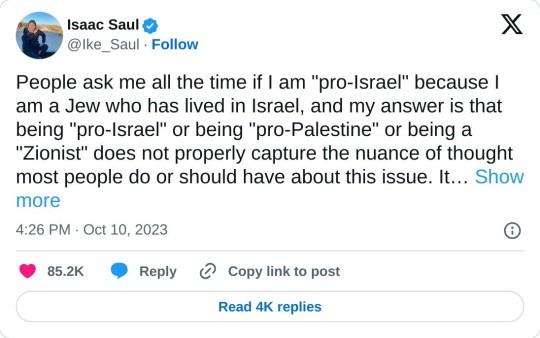
#jumblr#criticism of israel#Israel#Palestine#Gaza#Hamas#i/p#i/p conflict#oct 7 2023#pro israel#pro palestine
44 notes
·
View notes
Text
I'm gonna be wild and put this on an account where it might be shocking to post, but it needs to be said.
There is a genocide going on in Palestine, it is inherently wrong, and anyone who disagrees is upholding islamophobia and colonization.
Yes I have posts on my account that go against that and are more zionist. Guess what? I found out I was fucking wrong and I'm ashamed of myself for ever siding with those people. They're all on the wrong side of this conflict morally and it's reprehensible. It's also against Judaism, and even though they might argue that it isn't, Judaism has never been a religion that celebrates murder and slaughter as a solution, even if all else fails, which it hasn't in this case.
If you disagree with me, look up the founding of Israel, how the British government didn't care about Jews and just wanted them to go away and to have a puppet state that was friendly to them in the middle east, so they used Jews to achieve that. How could a country founded that way ever be moral? How could it be truly safe for Jews?
Look up how the Balfour Declaration was supposed to give non-Jews in the middle east rights and keep the rights of Jews outside of Israel safe. That's been a complete failure, I read it for the first time and laughed out loud. I don't know how anyone can look at that founding document and say "yep that's what Israel is doing today!" It's never been worse for Jews and it's all Israel's fault for constantly promoting the idea that the modern state of Israel is inherently central to Judaism, and not an ethnostate that's trying to slaughter the minorities around them that they don't like.
Look up the massacres that have been going on in Palestine. Attacks on displaced persons camps? Imagine if that had been Jews in the DP camps shortly after WWII. How many Jews would no longer be in existence if that had happened? How can people call themselves Jews if they support that? Think of the most recent massacre after writing this (on 6/9/24) - who the fuck disguises themselves as aid workers to sneak into somewhere and slaughter them? I saw rightful outcry when Hamas was doing that, and no pro-Israelis I saw protested against the IDF checking ambulances to 'make sure the need was real', so why is that being supported now? It's fucking disgusting, and if you aren't wholeheartedly condemning this you should be ashamed.
If you want to know the actual facts of what's going on and not the version that's been astroturfed by Israel (yes they have done this consistently over the past decades, look it up, there are literally campaigns to talk about how 'good' Israel is for queer people and the environment, as long as it's only their colonialist view of 'nice queers' and 'the Israeli environment'), try some books! I've read a few that are really good - Walking to Jerusalem by Justin Butcher and Light in Gaza edited by Jehad Abusalim, Jennifer Bing, and Mike Merryman-Lotze. Those books make it clear how reprehensible the behavior of Israelis are (throwing rocks at people for fun, demolishing peoples' houses and laughing, not letting them eat, constantly arresting and harassing them), and how despite all of it there are still Palestinians who are willing to work with Jews and consider them friends as long as they put in a bare minimum amount of support.
Or, you know, you could ignore this post and call me, a Jew, antisemitic for pointing out how awful Israel is being and how it's all against the laws of Judaism.
I hope everyone who disagrees is ready to make massive amounts of teshuvah in the future.
36 notes
·
View notes
Note
This is just a question, not counting oc's, who do you think would be the best girlfriend for Arthur? Do you think it could be Mary Linton, Mary-Beth, Sadie or Charlotte Balfour? You can also mention Charles ^^
In my opinion, I love the story Arthur had with Mary, but with Charlotte he was so sweet; I don't see him with Sadie (especially since she still has Jake very much in mind) and I think Mary-Beth looks better with Kieran (although I feel that she did have a crush on Arthur but he respected her because of the age difference, I mean he was 36 and she was 21.)
But what do you think about all this? Who do you think could have been the perfect pair for Arthur in canon? <3
Hi Crystal! Sorry I didn't answer your question sooner! Here is my very long rambling about this.
My reasoning is as follows; Arthur needs someone who can see the best in him as he usually can't see it in himself. Someone who could bring him up and find virtues in him he can't see. I think he would also need some physical affection and someone able to calm him down when his bitterness or angriness wins the better of him. Most of all, I think he expects loyalty from his s/o, and if not unconditional love, a serious relationship at least, maybe a deeper connection at best.
With all this in mind, my first choice would be Charles. I know Arthur isn't canonically bi but you said I could mention him so here we are. There is a reason why this ship is so popular in the fandom: Arthur and Charles definitely have a deep chemistry. The thing that struck me the most about them was the immaculate respect they have for each other, and their trust is beyond any level! Never once does Arthur suspects Charles to be the rat, never once does his opinion of him flattens; Arthur cares about him, is interested in his story, in his wellbeing... Charles definitely is one of the few who sees the good man Arthur can be, who sees beyond his tough facade and "dumb brute enforcer" role. Charles is also a quiet and very calm man; I think his natural demeanor could really match Arthur's more anxious way of thinking and heated actions.
Mary-Beth is a very sweet girl, I like her character but she doesn't strike me as the perfect match for our outlaw. We know she doesn't believe Arthur is a cold-hearted killer and he takes the time to talk with him at camp, so it's a plus, but it ends there imo.
Same goes for Sadie; her loyalty and the trust they share is very meaningful for Arthur. What bothers me is that we don't see Sadie before her loss. During the game, she's a changed woman; even in the epilogue. Losing her husband clearly has impacted her and I think she wasn't that cruel/impulsive before. To me she's really good in the role of Arthur's best friend/sister. She's a bit too much like him, more as a reflection of himself (both share losses from loved ones, both are very action-based and brave, both can be impulsive and brutal).
Charlotte is an interesting one to think about. I love her missions and how Arthur is helping her without judging her life choices (you want to live on your own in the middle of nowhere knowing you would probably die from starvation to honor your dead husband? Okay, I'll show ya how to hunt). I think she could fit pretty well considering her loyalty, her determination, courage, and sweet personality; but we don't have a lot of material to work with, sadly.
Finally, I know Mary has a lot of haters around the fandom but I'm definitely not one of them. She, like Charles, is one of the only ones who saw the good in Arthur, and probably one of the first ones in his life, ever. From what we can see in the missions and understand from their relationship, I see her as a caring and devoted lover even though she had to end their relationship. Arthur is a criminal but she didn't see him as just that. Until the very end, she wanted to believe in his better self, and to me it's one of the most important things: Mary was there to bring out the good in Arthur and lead him to a better path. We sadly know he chose not to follow it, but Mary was still there after all this time, trying to make a better version of him, and save him from this circle of violence he's stuck in. Mary will remain imo, even though their story is tragic, one of the best choices for Arthur.
NB. These are my personal opinions! I'm not claiming that it's absolutely true, feel free to disagree and argue with me!
#charthur fan here#also mary supporter here#arthur morgan#ask#pine ask#pine is talking way too much once again
16 notes
·
View notes
Text

Alan Cumming
As Host of The Traitors, the Multi-talented Star Brings a New Flamboyance to The Peacock Network's Hit Reality Game Show
by Brad Balfour
Not one to watch reality TV, I didn't really get what The Traitors (the US version) was all about. But since it was hosted by Alan Cumming, the gender fluid actor/artist, I was intrigued to hear him speak about the show. He's the host of the reality game show, which is based on De Verraders, the Dutch show created by Marc Pos and Jasper Hoogendoorn.
Having completed two seasons, the offbeat American version features Cumming in flamboyant costumes making grand gestures and arch pronouncements as contestants in the game move into a majestic castle. As a result, Cumming has garnered an Emmy nom for Outstanding Host for A Reality or Reality Competition Program (The Traitors). This further enhances the show's impact – but hopefully positive results will be in when the 75th edition of The Emmys airs September 15th on ABC.
The contestants work as a team to complete a series of dramatic and challenging missions. All of this to earn money for the prize pot. Some contestants are loyal, some are traitors – all of them established characters from other reality series.
Cumming – born on January 27, 1965, in Aberfeldy, Scotland – has had a long and distinguished career. He's done everything from editing pop magazines, a cabaret show, dramatic TV series, various stage versions of Shakespeare's plays and many starring roles in award-winning films. And, according to IMDB.com, "he's able to flawlessly change his voice and appearance for each role."
Now as he tackles The Traitors reality show, as both host and a producer, Cumming creates a new icon to connect to the LGBTQ community. At a recent screening of an episode, he spoke about this series just in time for Pride Month and preceding the Emmy nominations.
Alan Cumming, what makes you such an incredibly fun host to watch is that, unlike a lot of other reality shows, you really get into character. You become part of the cast in so many ways. What were your thought processes in coming into the show and figuring out how to play the role that you do within Traitors?
When they first talked to me about it, this was unlike anything I've ever done before. I couldn't quite understand why they'd ask me, but it sort of sounded fun. My agent said, "Oh, there's some show in a castle and they want you to do it." I took the meeting and realized they wanted me to, in a way, subvert the form of hosting a show like this by playing that sort of character. Everyone does a version of themselves when they host something that's not very true. But in this [case], it was actually a version of me and it's a very down-to-east Scottish layout. [My dog] Lala wasn't allowed to come the first time because of her papers, or COVID or something. But I said, "Oh, I should take my dog and pet her like a James Bond villain." I thought of it, and I still think of it as a character that I play who happens to be hosting all these people in this castle, which happens to be being filmed for American TV.
What makes the character so interesting is that for long-time fans of reality shows, you have a lot of personalities who are binary in nature and larger-than-life. That is why we watch them year after year, characters like C.T. and Adra, who have been on American television for decades. You somehow manage to out-character them in many ways. It's like navigating a lot of those personalities while playing that character.
In a way, it's because they have characters and they all come with their shtick. That's what's so interesting about doing it. The first series was comprised of half-real and half-reality people. Definitely, the people who are used to the camera and have an inbuilt persona already. They play themselves very well and understand the role they have to do. Then they're thrown into this thing where everything's destabilizing for them. I just guide them into situations that hopefully will destabilize them even more. That's what's fun about it. Everyone has a character in a way.
I think we're used to C.T. or Phaedra or people we've known for years. We understand their characters. We're now associates getting to know my character in it. I'm the stern daddy of it all. It's interesting to play that role and also, to try to keep some distance from them – the cast – on set. I don't talk to them or do takes. I don't engage with them in a chummy way like you might in a normal [situation] when there's other cast members. I very much think it's important that I have authority. They're scared of me. Then, of course, now, after it's all done, I can be like a normal person with them. I think you find that really overwhelming. They all came to my bar as it was when they were here earlier in the year doing the press thing. It was so hilarious. It was like them seeing Father Christmas having a drink or something.
That's the sign of a good host – that they're scared of you.
They should be scared of me because I've got to reprimand them sometimes. There's a lot of things, obviously, that are captured in the show that I've got in those situations where I've really got to intervene. My word is law. It's great fun. Clearly, I'm a terrifying figure, but I don't think I'm scary. Also, I don't take any shit. I know how to play a scary person. I'm fair but firm in real life.
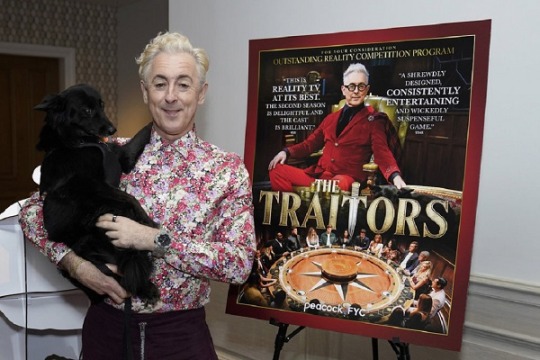
Part of what makes The Traitors so unique is that in so many other reality shows, both competition and lifestyle, there's no real setting other than the competition. You go to Survivor Island and do this thing. Or, if you look at Real Housewives, it is their real-life kind of, from time to time. Here, you have this beautiful gothic backdrop. A lot of the events, whether it's the funeral or going to a cemetery, feels very theatrical – and creepy. We're almost subverting the narrative of what this type of show format really is while also being [true] to the format.
What I think is liberating is the theatricality of it. Everyone in television is very scared of theatricality. If you ever try to pitch a show to a TV executive, the word "theater" or "theatrical" is poison to them. It's very liberating that theatricality is in its very DNA. It's gothic and camp in the true sense of the term. American people sometimes don't have the same understanding of what camp means to British people. What we're doing on the trade is camp. There's an annoyingness to it, an archness of theatricality, and a winking at the audience all the time about what it is.
There's me in those insane costumes in this castle saying, "Welcome to my castle." We're bringing all these nutty personalities out of their comfort zones and then making them do insane things and pitting them against each other. It's so amped up already in a sort of gothic [manner] of what it's trying to do. The core of it is just a game. All those shows – as I've discovered now in my crash course in reality competition television over the last couple of years – are basically the same.
Survivor is the same as RuPaul's Drag Race is the same as the chef one. They're all people doing things and then slowly one person gets put out and then they have to hold. Then there's intrigue. Basically, it's just like schoolyard games of pushing one person out until it's just the next thing. In a way, what's good about this is that that's all it is. But it's got all these psychological layers that I think people underestimate. Also, you're in a castle and they're maddened, these contestants, because they're not allowed to pick up their phones. They're not allowed to talk to each other. All they think about from morning to night is the show and the game. And they go nuts. It's great.
We mentioned something, this idea of camp in the British sense of the term. Not necessarily what we think of it as evidenced by the Met Gala themes.
The theme was a good idea. People just didn't understand it.
The Traitors has a British counterpart. There was a version of this before the U.S. version. What's your take on what had to change within the format for a different audience, or if there had to be any changes, because television has become so much more globalized? Audiences are more open and receptive to different types of formats of television and different types of humor.
I don't really know how to answer that question. I saw some of the first season of the British one. It's not as camp and theatrical as ours. I think this is probably the first time in television history that an American version of the show is more camp and theatrical than the British one. I think that's me, in my opinion. But I feel like, in a funny way, we were able to have more leeway in that department. That's partly down to the costumes and Sam Spector, the stylist – he and I had an idea of the character I wanted to play.
[The British host] Claudia Winkelman has such a lovely personality and a lovely way in which she deals with people. They have real people, as well. They don't have celebrities. It's all a bit toned down and quite British. Whereas we were able – partly because it was a new show and partly because of the costume thing and me being this character – we've amped it up. It's got this higher level of theatricality built into it. I think sometimes other countries try to do that. But I don't think they're quite as nuts as we are. I know that now there's something someone said, "Claudia does your thing when she throws a picture on the floor now." I was like, "Yes, you bitch, throw away my little picture." But it's kind of funny. Sometimes I see little clips of people from other countries' versions. It's like, "Oh, it seems like it's sort of a fever dream." You know vaguely what they're talking about, but the circumstances are all different.
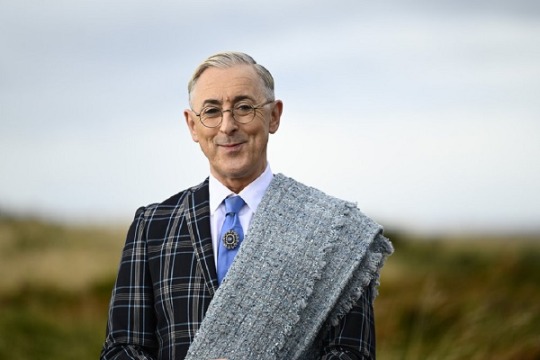
Going to the opposite of toned down, your outfits on the show are probably some of the best parts of it. They somehow get even more fabulous and glamorous every episode. How involved are you with choosing the outfits versus someone else?
Well, very involved. I talk to Sam all the time. especially in the first season, because I said I wanted to be this dandy Scottish laird. You know what a laird means? It's like lord in a Scottish accent, a Scottish dandy, an aristocratic gent. To me, that means a lot of tartan, a lot of cloaks might be featured, things like that. I went to him with that idea and those sorts of things. Then he ran with it. We go back and forward. Then the second season, we were able to amp it up a bit. He themed the missions with my clothes. There's one with birds. I just have a funny big peacock on my hat and stuff like that. For the next one, I'm about to go and do it again. It's amped up again, more about layering things.
I have this great relationship with him. We text all the time. He sends some stuff to me, just ideas and things to improve. I think we're going more and more and bigger and bigger. I think surely, they're going to stop us soon. But one thing I really do like about it is that – in terms of if we think about what's happening in America and the way that trans people and non-binary people are facing lots of hatred and challenges – me, in this show as a middle-aged man, I'm being quite femme-y and wearing a lot of practically feminine female clothes. What's really interesting is to be able to do that in a mainstream way, and challenge people's perceptions of what male and female is, and maybe be a bit in the middle.
Hopefully, when the audience sees someone in the street who is non-binary or non-gender conforming, they won't be as shocked or horrified. They'll see me in a fanny dress and a cloak the night before. That's a really positive, accidental thing that's come out of this theatricality of the costumes. One of the things that didn't make it is ... I saw it today in my dressing room in my house because I was doing a fitting for some little film I'm doing. I opened this cupboard in the last episode of the last season. It was all on this big ship, which was another story because we had a hideous storm, and it was like "Triangle of Sadness." It really was. I was vomiting into a metal bowl. I'll never forget it. Thank you. And bon appetit. But there was a funny little hat that had a little galleon on it with sails. It was hilarious. It was this Tracy-esque sort of thing. Absolutely bonkers. So impractical and nuts. It was on theme for the thing. But it was so windy that day that it kept falling off my head. Now I have it as a little memory.
As hosts, you are effectively the audience of the show. We're seeing a lot of the things that you're seeing and your commentary throughout the challenges is both biting and reflective of how we're thinking. One of the themes that emerges in this episode you all saw as well leads up to this idea with these contestants, of gamers, those who have been on competitive reality shows and the non-gamers – what they refer to as the bravo, basically anyone that sits up and has fancy wine as part of their show. Is there a core advantage to one side or the other?
No, it was the funeral episode. The funeral. Yeah, hilarious. But I just love that because I liked it. As the series went on, they showed me more of me laughing. Obviously, it's Pedro falling in the water. I just loved seeing how he's always getting wet.
Who doesn't?
Who doesn't? But the thing I think about that, I thought was really interesting about the second season – this truly has been a crash course for me – I'm really at the center of it and I can experience it. I feel that a lot of people said that "Oh, the gamers, they know how to do this, the survivors, the big brothers, the CT did." The challenge, yeah. The perception is they are devious, and they know how to do this game, whereas the outsiders are, oh, you know. That's not true. It was proven wrong in this season because – like, who was the one who worked it all out, blew it in his execution of it – was the cutie little bachelor, Rafaela Peet. So, you know, the other non-gamer. That to me was really exciting because I loved when our perception about the game was just smashed. Although I guess two gamers did win, but you know ... it didn't necessarily mean it was because of their game win. It's that somebody had to win. I think it's really interesting. It's a much more level playing field. Also, it's a game of chance. You're a traitor because I tap you on the shoulder.
That's why I loved it when, a couple of weeks in, they're going mental. They're like, "I could never be a traitor." I go, "You would if I tapped you on the shoulder." That's why the show is so good. It really screws with people's minds, with the psychological, and the hurt and guilt that people get as well. The guilt [comes from] lying to your friends and everything. It's layer upon layer of awfulness. Having seen people in physical distress, it's always hilarious.
In the first episode of this [season], as you're walking around, you're going to pick the traitors. You do it a few times, and there's conversation afterwards amongst the cast members about the sound of your jacket rustling as you lift an arm. Or your footsteps and the sound of breathing happening. How did you approach that moment of, "I need to make this as secretive as possible?"
It was absolutely the most terrifying part of the whole thing. I could fuck it up immensely in one fell swoop if they heard me or something. There were more of them this year. I do all sorts of things. The first year, we filmed a thing where I touched every single person. We've got the close-up of my hand going on the thing. We filmed that first. They've got an idea of what it feels like to be touched. Then we go round and round and round and round. In terms of the rustling, I would do this. Right in front of their ears. It's so fun.
I really enjoy it; it's the scariest part because I have a thing in my ear all the time. I can hear in the control room. When we're inside the castle, they're all in the control room, which is like NASA. It really is insane. I could feel the tension because it was the first thing of the show. Obviously, it's very tense in the room. When you're blindfolded, your other senses get much more aware. So it's really, really scary. I'm trying to get in and just do it without touching anything. I was just talking with Sam, the stylist, this week about what I was going to wear for that bit. Of course, there were things on my lapels. I thought that would be terrible if you heard them. You have to be really conscious of stuff like that. It's because everyone's senses are so heightened. But it is exciting and terrifying.
Out of all of your friends or celebrities that you know, who do you think would be great on a season of The Traitors? And what would you have more fun with or which role would you think would be better – a traitor or a faithful?
I would like to be a traitor. I think everybody would like to be a traitor. It's just getting to go to the turret late at night and think who you're going to kill. I just think it's such fun. They get extra snacks when they go to the turret sometimes. But I don't know. Some people really don't want to be like that. That's why we do this thing now when I interview them. It's just hilarious. Lala and I are sitting there, and they come in one at a time, and they're really terrified. Some people are adamant they don't want to be a traitor.
Of course, that's actually quite a good idea to make them a traitor when they're doing that. That's what I love about the game, is all these weird, confounding things you can do. Some people very much do think, well, you're not going to. It's actually really interesting, the mix of people that we choose for the show is all based on a lot of factors. But in terms of people that I know, we were just talking about her actually.
I think Martha Stewart would be so good at it. She's so bossy and sort of strategic and so accomplished and everything. She would make that raft. She would get that catapult going. And, also, I just think she would be at home in a castle. So there's people like that. But I love those people who come on the show. I don't know who they are.
Copyright ©2024 PopEntertainment.com. All rights reserved. Posted: July 22, 2024.
Photo #1 by Brad Balfour © 2024. All rights reserved.
Photos #2 & 3 © 2024 Ralph Bavaro and Euon Cherry. Courtesy of Peacock. All rights reserved.
youtube
9 notes
·
View notes
Note
Came here through a mutual, and I'm intrigued by the fic you're writing. Any particular reason you picked Charlotte Balfour as your deuteragonist? Wonderful writing, by the way. :-)
Thank you for your kind words, and for this ask!! (Also apologizing in advance for how long this is lol, the short answer is I am so autistic about these characters /lh)
The first reason I started writing echoed fragments was because after replaying the epilogue for the second time I couldn’t stop thinking about the way Charles’ grief has so strongly changed him and is still impacting him 8 years later; I’m a Charthur truther to my core, but even in a platonic interpretation Arthur’s death (and the destruction of the gang, it wasn’t just about Arthur) was something that he hadn’t healed from all that time later.
To be someone as principled, skilled, and talented as Charles and to end up in the depths of Saint Denis, throwing street fights for money and being somewhat entangled with the mob? The way he throws himself into protecting John and Uncle when he had no real obligation to do so? That’s a man still reeling from the loss of the first community he’s let himself form a connection with since losing his family at a young age, and who possibly still feels guilty about leaving and not being there when the bitter end came, even though leaving when he did was inarguably the right thing to do.
Despite the fact that Charles cut ties and had the cleanest getaway of any of them, he *chose* to come back and faced the aftermath alone, carried Arthur across state lines to bury him, alone, and then what?? He spent the next 8 years alone? Why did he not return to the Wapiti, or if he did, why did he leave if his other option was being on his own, throwing street fights in Saint Denis, where he would have still been a wanted man??
Whatever happened to Charles between 1899 and 1907, if the end result was Uncle - of all people - hearing rumors about Charles from states away, and Uncle *of all people* deciding that Charles was in enough trouble that they needed to intervene… it couldn’t have been anything good. I wanted so badly for him to have a chance to properly grieve and actually heal, and to not be alone through that process, so I decided that if R* wasn’t going to do it then I would lol
At the same time, Charlotte is one of the characters that I absolutely love to talk about and roll around in my brain. The more I thought about Charlotte and her mission line, the more I started to realize just how much these two had in common, personality-wise and particularly in regard to their freshly acquired grief and how it left them utterly alone after their loss, since both live on the outskirts of society (albeit for very different reasons, but the end result is the same).
The difference for Charlotte is that when she was at her absolute lowest, someone stepped in and was able to pull her back onto her feet - it quite literally saved her, and she went on to live a very meaningful and fulfilling life thanks to the care and compassion that Arthur showed her.
Charles was a close friend of the man who saved her life (whom she can no longer do anything to help), PLUS that man is fresh off the type of grief she knows all too well and is still working through herself; I think that given the opportunity Charlotte would want to pay that compassion forward. In addition to being able to grieve their losses together and having someone to lean on who knows exactly what you’re going through, I also just think they would have gotten along very well if they had ever crossed paths, so I made sure they did :3
The writing itself is slow going, but I have a whole general outline for this AU that already extends past the RDR1 canon timeline - one of the core ideas I want to explore is how the ripple effects of Arthur’s actions at the end of his life (mostly following canon with some slight modifications) end up having lifelong impacts for those who survived, and Charlotte happens to be one of the early indicators of that ripple effect. By showing her how to hunt he taught her to survive, and by giving her his horse he facilitated a personal connection that Arthur himself could never have anticipated - but because of that, the impacts of Arthur’s choices continue to resonate throughout the years.
#cm answers#anon ask#i can talk about the echoedverse for hours i am thinking about it constantly#thank you again for sending this in!!#echoedverse
9 notes
·
View notes
Note
@ike_saul on twitter posted thIs.
I know it's long. The caveat is this is from a Jewish persons perspective. 
People ask me all the time if I am "pro-Israel" because I am a Jew who has lived in Israel, and my answer is that being "pro-Israel" or being "pro-Palestine" or being a "Zionist" does not properly capture the nuance of thought most people do or should have about this issue. It certainly doesn't capture mine.
I have a lot to say. I’ve spent the last 72 hours writing, texting, and talking to Israelis, Jews, Muslims, and Palestinians. Much of my reaction is going to piss off people on "both sides," but I am exhausted and hurting and I do not think there is any way to discuss this situation without being radically honest about my views. So I'm going to try to say what I believe to be true the best I can.
Let me start with this: It could have been me.
That's a hard thought to shake when watching the videos out of Israel — the concert goers fleeing across an empty expanse, the hostages being paraded through the streets, the people shot in the head at bus stops or in their cars. I went to those parties in the desert, I rubbed shoulders with Israelis and Arabs and Jews and Muslims, I could have easily accepted an invitation to some concert near Sderot and gone without a care, only to be indiscriminately slaughtered. Or, perhaps worse, taken hostage and tortured.
I don’t believe Hamas is killing Israelis to liberate themselves, nor do I believe they are doing it to make peace. They're doing this because they represent the devil on the shoulder of every oppressed Palestinian who has lost someone in this conflict. They're doing it because they want vengeance. They are evening the score, and acting on the worst of our human impulses, to respond to blood with blood — an inclination that is easy to give in to after what their people have endured. It should not be hard to understand their logic — it is only hard to accept that humans are capable of being driven to this. Not defending Hamas is a very low bar to clear. Please clear it.
It’s not possible to recap the entire 5,000 year history of people fighting over this strip of land in one newsletter. There are plenty of easily accessible places you can learn about it if you want to (and, by the way, many of you should — far too many people speak on this issue with an obscene amount of ignorance, loads of arrogance, and a narrow historical lens focused on the last few decades). But I'll briefly highlight a few things that are important to me.
In my opinion, the Jewish people have a legitimate historical claim to the land of Israel. Jews had already been expelled and returned and expelled again a half dozen times before the rise of the Muslim and Arab rule of the Ottoman Empire. Of course it’s messy because we Jews and Arabs and Muslims are all cousins and descendents of the same Canaanites. But Arabs won the land centuries ago the same way Israel and Jews won it in the 20th century: Through conflict and war. The British defeated the Ottoman Empire and then came the Balfour Declaration, which amounted to the British granting the area to the Jewish people, a promise they’d later try to renege on — all before the wars that have defined the region since 1948.
That historical moment in the late 1940s was unique. After World War II, with many Arab and Muslim states already in existence, and after six million Jews were slaughtered, the global community felt it was important to grant the Jewish people a homeland. In a more logical or just world that homeland would have been in Europe as a kind of reparation for what the Nazis and others before them had done to the Jews, or perhaps in the Americas — like Alaska — or somewhere else. But the Jews wanted Israel, the British had taken to the Zionist movement, the British had conquered the Ottoman Empire which handed them control of the land, and America and Europe didn’t want the Jews. As a result, we got Israel.
The Arab states had already rejected a partitioned Israel repeatedly before World War II and rejected it again after the Holocaust and the end of the war. They did not want to give up even a little bit of their land to a bunch of Jewish interlopers who were granted it all of a sudden by British interlopers who had arrived a hundred years prior. Who could blame them? It had been centuries since Jews lived there in large numbers, and now they wanted to return in waves as secularized Europeans. Many of us would probably react the same way. So, just as humans have done forever, they fought. The many existing Arab states turned against the burgeoning new Jewish state. One side won and one side lost. This is the brutal and broken and violent world we live in, but it is what created the global world order we have now.
Are Israelis and British people "colonizers" because of this 20th century history? Sure. But that view flattens thousands of years of history and conflict, and the context of World War I and World War II. I don’t view Israelis and Brits as colonizers any more than the Assyrians or the Babylonians or the Romans or the Mongols or the Egyptians or the Ottomans who all battled over the same strip of land from as early as 800 years before Jesus’s time until now. The Jews who founded Israel just happened to have won the last big battle for it.
You can’t speak about this issue in a vacuum. You can't pretend that it wasn't just 60 years ago when Israel was surrounded on all sides by Arab states who wanted to wipe them off the face of the planet. Despite the balance of power shifting this century, that threat is still a reality. And you can't talk about that without remembering the only reason the Jews were in Israel in the first place was that they'd spent the previous centuries fleeing a bunch of Europeans who also wanted to wipe them off the face of the planet. And then Hitler showed up.
American partisans have a narrow view of this history, and an Americentric lens that is infuriating to witness. As Lee Fang perfectly put it, "Hamas would absolutely execute the ACAB lefties cheering on horrific violence against Israelis if they lived in Gaza & U.S. right-wingers blindly cheering on Israeli subjugation of Palestinians would rebel twice as violently if Americans were subjected to similar occupation."
And yet, many Americans only view modern Israel as the "powerful" one in this dynamic. Which is true — they obviously are. It isn't a fair fight and it hasn't been for decades because Israel's government is rich and resourceful, has the backing of the United States and most of Europe, and has an incredibly powerful military. At the same time, Israeli leadership has made technological and military advancements that have further tipped those scales — all while the Israeli government has helped create a resource-thin open air prison of two million Arabs in Gaza.
Conversely, Palestinians are devoid of any real unified leadership, and the Arab world is now divided on the issue of Palestine. Israel is unwilling to give the people in Gaza and the West Bank more than an inch of freedom to live. These are largely the refugees and descendents of the refugees of the 1948 and 1967 wars that Israel won. And you can't keep two million people in the condition that those in the Gaza strip live in and not expect events like this.
I'm sorry to say that while the blood on the ground is fresh. The Israelis who were killed in this attack largely have nothing to do with those conditions other than being born at a time when Israel and Jews have the upper hand in this conflict. Some of the victims weren’t even Israeli — they were just tourists. This is why we describe them as “innocent” and why Hamas has only reaffirmed that they are a brutal terror organization with this attack — an organization that I hope is quickly toppled, for the sake of both the Palestinian people and the Israelis. But as someone with a deep love for Israel, with friends in danger and people I know still missing, it breaks my heart to say it but I'm saying it again because it remains perhaps the most salient point of context in a tangled mess full of centuries of context:
You cannot keep two million people living in the conditions people in Gaza are living in and expect peace.
You can't. And you shouldn’t. Their environment is antithetical to the human condition. Violent rebellion is guaranteed. Guaranteed. As sure as the sun rising.
And the cycle of violence seems locked in to self-perpetuate, because both sides see a score to settle:
1) Israel has already responded with a vengeance, and they will continue to. Their desire for violence is not unlike Hamas’s — it’s just as much about blood for blood as any legitimate security measure. Israel will “have every right to respond with force." Toppling Hamas — a group, by the way, Israel erred in supporting — will now be the objective, and civilian death will be seen as necessary collateral damage. But Israel will also do a bunch of things they don't have a right to. They will flatten apartment buildings and kill civilians and children and many in the global community will probably cheer them on while they do it. They have already stopped the flow of water, electricity, and food to two million people, and killed dozens of civilians in their retaliatory bombings. We should never accept this, never lose sight that this horror is being inflicted on human beings. As the group B’Tselem said, “There is no justification for such crimes, whether they are committed as part of a struggle for freedom from oppression or cited as part of a war against terror.” I mourn for the innocents of Palestine just as I do for the innocents in Israel. As of late, many, many more have died on their side than Israel's. And many more Palestinians are likely to die in this spate of violence, too.
Unfortunately, most people in the West only pay attention to this story when Hamas or a Palestinian in Gaza or the West Bank commits an act of violence. Palestinian citizens die regularly at the hands of the Israeli military and their plight goes largely unnoticed until they respond with violence of their own. Israel had already killed an estimated 250 Palestinians, including 47 children, this year alone. And that is just in the West Bank.
2) Every single time Israel kills someone in the name of self-defense they create a handful of new radicalized extremists who will feel justified in wanting to take an Israeli life in retribution sometime in the future. Half of Gaza’s two million people are under the age of 19 — they know little besides Hamas rule (since 2006), Israeli occupation, blockades, and rockets falling from the sky. The suffering of these innocent children born into this reality is incomprehensible to me. They will suffer more now because of Hamas’s actions and Israel’s response, all through no fault of their own.
There is no way out of this pattern until one side exercises restraint or leaders on both sides find a new solution. Israelis will tell you that if Palestinians put their guns down then the war would end, but if Israel put their guns down they'd be wiped off the planet. I don't have a crystal ball and can’t tell you what is true. But what I am certain of is that every time Israel kills more innocents they engender more rage and hatred and recruit more Palestinians and Arabs to the cause against them. There is no disputing this.
So, why did this happen now?
I'm not sure how to answer that question except to say it was bound to happen eventually. It was a massive policy and intelligence failure and Netanyahu should pay the price politically — he is a failed leader. Iran probably helped organize the attack and the money freed up by the Biden administration's prisoner swap probably didn't help the situation, either. Israel's increasingly extremist government and settlers provoking Palestinians certainly didn't help. Nor has going to the Al-Aqsa mosque and desecrating it. Nor do blockades and bombings and indiscriminate subjugation of a whole people. Nor does refusing to talk to non-terrorist leaders in Palestine. Nor does illegally continuing to expand and steal what is left of Palestinian land, as many Jews and Israelis have been doing in the 21st century despite cries from the global community to stop. A violent response was predictable — in fact, plenty of people did predict it.
Israel is forever stuffing these people into tinier and tinier boxes with fewer and fewer resources. But if you want to blame Israeli leaders for continuing to expand and settle land that does not belong to them (as I do), then you should also spare some blame for Palestinian leaders for repeatedly not accepting a partitioned Israel during the 20th century that could have led to peace (as I do).
Please also remember this: Hamas is still an extremist group. The Palestinian people do not have a government or leaders who legitimately represent their interests, and it sure as hell isn't Hamas. Will some Palestinians cheer and clap at the dead, or spit on them as they are paraded through Gaza? Yes they will. And they have. Many will also mourn because they loathe Hamas and know this will only make things worse. This is no different than how some Americans cheer at the dead in every single war we've ever fought. It's no different than the Israelis who set up lawn chairs to watch their government bomb Palestine and cheer them on, too. This doesn't mean Palestinians or Israelis or Americans are evil — it means some of them are giving in to their violent impulses, and their zealous feelings of righteous vengeance.
Solutions, you ask? I can’t say I have any. If you came here for that, I’m sorry. The two-state solution looks dead to me. A three-state solution makes some sense but feels out of the view of all the people who matter and could make it happen. I wish a one-state solution felt realistic — a world of Israelis and Arabs and Muslims and Jews living side by side with equal rights, fully integrated and defused of their hate, is a version of Israel that I would adore. But it seems less and less realistic with every new act of violence.
Am I pro-Israel or pro-Palestine? I have no idea.
I'm pro-not-killing-civilians.
I'm pro-not-trapping-millions-of-people-in-open-air-prisons.
I'm pro-not-shooting-grandmas-in-the-back-of-the-head.
I'm pro-not-flattening-apartment-complexes.
I'm pro-not-raping-women-and-taking-hostages.
I'm pro-not-unjustly-imprisoning-people-without-due-process.
I'm pro-freedom and pro-peace and pro- all the things we never see in this conflict anymore.
Whatever this is, I want none of it.
.
5 notes
·
View notes
Text
“A Racist, Criminal Project”: Palestinian Historian on 1948 Nakba, Israel’s War on Gaza & U.S. Complicity
MAY 15, 2024 ABDEL RAZZAQ TAKRITI: Thank you, Amy.
"Well, first of all, I want to note that the numbers that are used by Palestinian historians now about the numbers of Palestinians that were expelled are at least 900,000. The Nakba witnessed the destruction of Palestinian society, the destruction of Palestinian urban life. The two most important cities, the cultural and economic capitals of Palestine, Haifa and Yaffa, were lost during the Nakba. A host of other cities were lost during the Nakba. Five hundred and thirty villages were completely depopulated during the Nakba. And out of a population of 1.4 million, you had the vast majority being displaced.
So this is a very significant event in Palestinian history. It’s a horrific event. And what’s very shocking about it is that it was an internationally sanctioned event in many ways. It was the byproduct of a policy that was created by the so-called international community during the mandate period, when they instituted the mandate system under the League of Nations. And they did something very unique in world history, which is to sanction the establishment of a settler-colonial presence in Palestine. So, it’s a very late settler colonialism, but it was a settler colonialism that led to the expulsion of the native population 30 years after the Balfour Declaration that instituted the settler-colonial program in 1917."
ABDEL RAZZAQ TAKRITI: "Yeah. So, this is a criminal trying to hide their crime. They’ve committed the crime. By the way, the current Israeli government, they’re the descendants of the people that created the Nakba. And I’m talking here individually. So, Netanyahu’s father was a member of the Irgun, Benzion Netanyahu. That was a terrorist organization that carried out the ethnic cleansing of Yaffa. It bombarded the city of Yaffa, besieged it mercilessly, put its inhabitants under ruthless danger. And, you know, somebody like Yoav Gallant, who is currently engaging in major ethnic cleansing and genocide in Gaza, his father named him after Operation Yoav, which led to the depopulation and the expulsion of the majority of southern Palestine and its cornering into Gaza. So, these people who are the children of those that committed this crime are trying to engage in Nakba denialism by banning the commemoration of the Nakba. They’re trying to hide the crime so as to be able to continue committing similar crimes in the present.
And this is a very important point. You know, I’ve been engaged in Nakba education for a long time, and I always say we have to apply four principal rules to Nakba education."
0 notes
Text
@miss-polly asked: ❛ what else do you want me to say? ❜

"Well, if you really felt like it, you could tell me how clever and handsome and talented I am and I definitely have a whole load of career options ahead of me."
He was smiling, but there was no denying the anxious edge to him. It was an odd thought, life after football. Especially given that Balfour had never really known anything else. As much as he'd been trying not to go on too long about it, anxiously wringing his hands in his lap as he spoke, well... talking to Elethea was complicated sometimes. But Polly? Too easy. So easy, he was starting to feel guilty.
"You can just tell me to shut up, though. Honestly. I'm - boring you to death, surely."
1 note
·
View note
Text
I was reading The Hundred Years War on Palestine by Rashid Khalidi when I heard the news about Resolution 888 in the US house of representatives. Khalidi separates 100 years of history(1917-2017) by what he calls 6 Declarations of War. In each of these chapters he highlights things like the Balfour Declaration, UN General Assembly Resolution 181, and the Oslo Accords. It is so incredibly disheartening to think that the book could have just continued on. The 7th Declaration of War, following the 2023 Hamas attack and disproportionate Israeli retaliation, US House of Representatives votes almost unanimously on Resolution 888. Despite the protests of its citizens, the US affirms Israel's right to exist and declares that anyone who challenges that is antisemitic.
When are we going to stop fucking over other countries? First it was Britain, then it was (and is) the US. My government sticks its grubby little hands in other people's business and then wonders, how could it have gotten this bad?
Khalidi says this towards the end of the book:
“While the fundamentally colonial nature of the Palestine-Israel encounter must be acknowledged, there are now two peoples in Palestine, irrespective of how they came into being, and the conflict between them cannot be resolved as long as the national existence of each is denied by the other. Their mutual acceptance can only be based on complete equality of rights, including national rights, not withstanding the crucial historical differences between the two.”
The US has had a massive hand in creating an environment where both sides deny the humanity of the other. (And don't mishear me, I know this is not an even fight). And if the US truly had any desire for peace in the region it would start with the humanity of EVERY person. And it would be predicated on Equal rights for every one of those people. But as a colonial empire, the US government isn't really interested in peace is it? Instead they are stoking the vile embers of islamophobia and antisemitism and still trying to come out looking like the good guy.
But we won't look away from their sins and we won't forget. They aren't listening to us. They've tried ignoring our calls for a ceasefire. They don't want to hear us calling for the recognition of every person's humanity, at home and in the Middle East. So don't stop talking about it. Don't stop demanding better. Don't let them rest until they get the message. Hold your representatives accountable.
1 note
·
View note
Text
Lighting and Stranger Things Season Four - Full Analysis (Pt.37)
Now where where we? Ah, yes. In the pit of despair. So, after the monologue, Vecna gets his shit rocked by everyone. My favourite thing in season four (besides the lighting and Will) is in this part of episode nine. And I have wanted to talk about it for like. Three months.
S4:E9 - FIRE!!!! (#1)
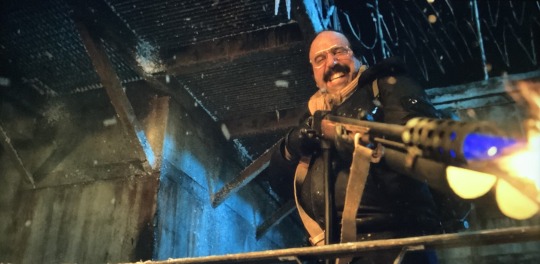
So, Murrays got a flame thrower. In the latter half of the Vecna battle, it’s all fire. The fire has a few distinct characteristics that are emphasized when we see it. First, it’s intentional and directed. Like Murray with his flame thrower, he aims it and intentionally fires at a target. Second, the people fighting with fire are our characters that we’re rooting for. That’s their weapon of choice, not Vecna’s. And thirdly, and most importantly, the fire we are shown has two distinct colours. And yes, while this is just science because blue fire is hotter than yellow and orange- our attention is drawn to this aspect of fire in these shots. These two colours.
Blue and yellow.

Nancy, Steve and Robin are freed from the vines. A few notes about their costuming; Robin has a red hat and a vest, Nancy has a gun and pink nail polish, and Steve has visible patches and his watch is in shot. Will Byers in season one episode one, was wearing a red vest and notably had a shotgun. Eddie, when he dies, tries to get away on a bike. The bikes this season have had different tones of light, Eddie and Robin’s being the brightest when compared to Steve and Nancy. In the second half of the Vecna fight Robin, Nancy and Eddie have objects around them and on them, that point to Will in season one, episode one.
“God, we need Will,” is a line that persists all throughout season four. Max draws the Creel house, they communicate with the lights in the Upside Down, Max confronts Vecna, they track Vecna with the lights. They’re doing exactly what Will has already done. They’re piggybacking off of Will’s experiences.
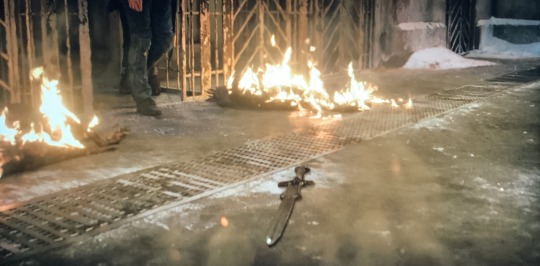
Hopper picks up this sword after Murray sets everyone on fire. The way that this is shot, makes me think that this sword is more than just a symbol of protection and bravery. And all that sword stuff. We’re meant to look at it and make connections. Important objects have emphasis- like Will’s painting, and the fire, and the stained glass window behind El. We are meant to look at them.
Within Stranger Things, there is one specific sword that comes to my mind. The sword outside of Castle Byers. Another connection to Will.
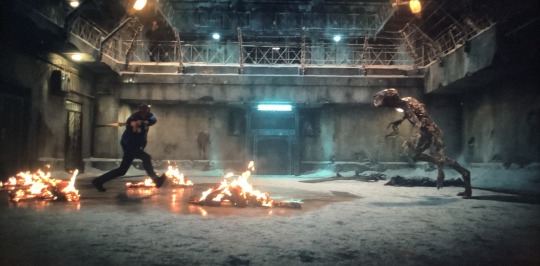
The lights here are yellow and blue. Like the fire was. Yellow and Blue are Mike and Will’s colours, and Mike and Will were absent from the main supernatural arc this season. Even in a different country- Joyce, Hopper and Murray managed to get themselves involved in the Upside Down. El was learning about her past, everyone in Hawkins was dealing with Vecna- but Mike, Will, Jonathan and Argyle were visiting Suzie. And having heart to hearts. And finding El. They had nearly no connection to anything happening in Hawkins. But everything in this last half of the battle seems to be saying they should’ve been there.
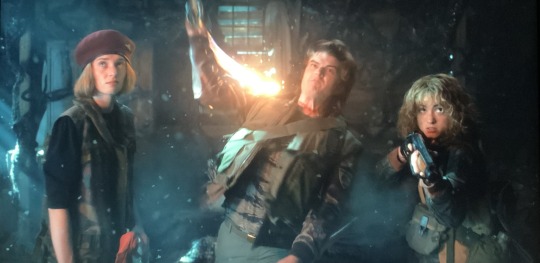
Steve throws the first molotov cocktail. But Robin is more interesting. She’s got her vest and red hat which I mentioned before, but now we can see that even the cloth in her molotov cocktail is red. Red like Coca Cola, and blood, and the accents on Will’s cloths in season one and three. Like the heart on Will’s painting.

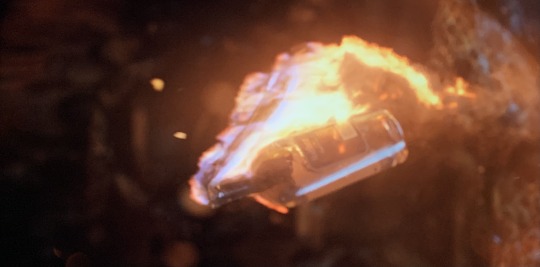
We get a close up slow-mo shot of this thing flying through the air. We’ve got red and blue accents, which if we’re in line with the Snow Ball- mean forced conformity. The fire, like Murray’s flame thrower, is blue and yellow. There’s a lot going on here. Especially the fact that the name of the alcohol is ‘Balfour’.
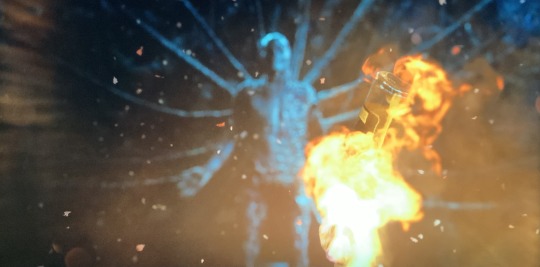
The setting that they’re in is blue- this contrasts the fire really well. I also just wanted to mention the stuff they put into each frame? Like there’s different colours and overlays and circles of light, and it’s a whole lot of editing. I think it’s really cool. There’s just so much that’s been put into this scene.

Hopper cuts off the demogorgon's right arm. The left arm is the Vecna related one. So this could be furthering the idea that they’re losing this fight because they went about it the wrong way. Another thing is that Hopper (and Joyce’s) Jacket is red and blue. And the setting is somewhat red and blue tinted. That also points to themes of forced conformity, as was established by the Snow Ball in both season two, and in this season when we went back there with Max.
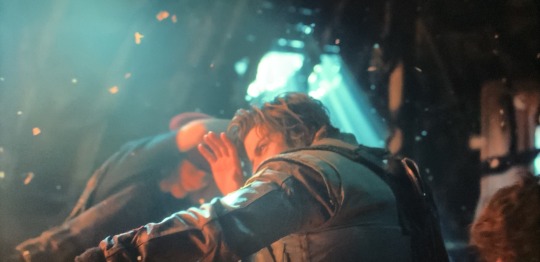
They set Vecna on fire. And we’ve got more red and blue.
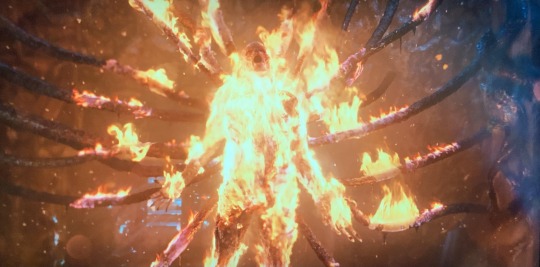
I’m counting twenty vines connected to Vecna, which is a bad number for him to be associated with. Twenty is A. the highest roll on a twenty sided die, and B. a critical hit. If you roll a twenty on an attack role then you double the numbers you roll on the damage dice (usually- some classes have other things when you roll a twenty). And if you roll a twenty elsewhere, like say a death save (when you are at zero hit points and dying. You have three death saves. You fail three, you die, you succeed on three, you live.) you stabilize and gain a hit point. So if Vecna’s rolling 20′s- it’s bad. Erica rolled a 20 and beat Vecna in Hellfire. Maybe Vecna’s doing the same shit- but reversed.

The Creel house dissapates when Vecna is set on fire. The outside intervention is what made him leave. El fighting him didn’t seem to have an effect on that.
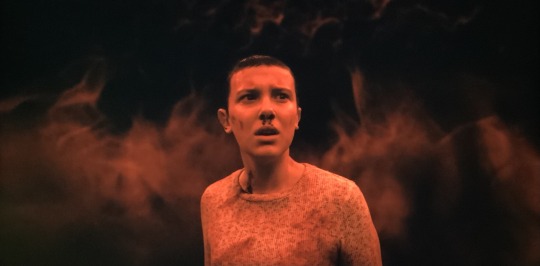
There’s something weird going on with all this. Because El looks confused as it all fades to black. When El finds people, she’s usually isolated to that person- not their surroundings. When she found Billy in season three, he was already taken by the Mind Flayer. Henry’s powers appear to be focused more on this plane than the outside world. Where as El is some what the opposite of that.
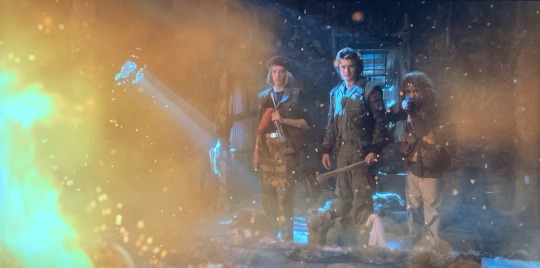
Vecna doesn’t throw Robin, Steve and Nancy across the room. Or break their arms. Most of what El does is absent in Vecna’s fighting, when he’s not in some ones head.

Sure, he’s on fire and standing- something that may indicate fire is not exactly his weakness. At least in this state- or the fire is being thrown by the wrong people. But they’re not dead, and if El were in a position like this, the people in front of would not be like that for very long.
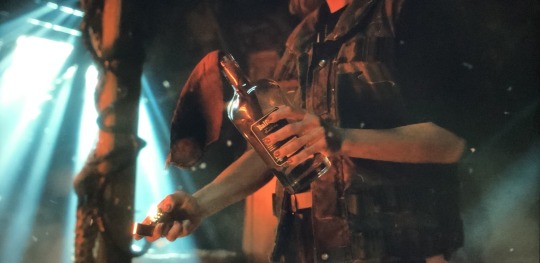
Robin picks up the red molotov cocktail. Her (pink/red) nail polish covers the ‘four’ and we’re left with ‘Bal’.
She’s literally throwing a fucking fireball at him.
And we’re meant to notice it.
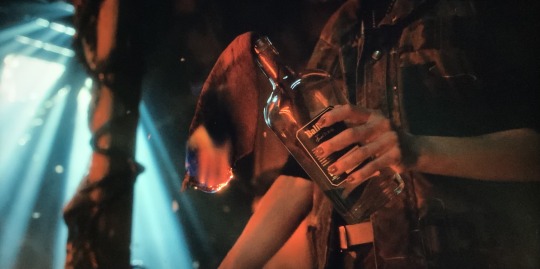
Like, we’re REALLY meant to notice it. This one shot goes on for a hot second.


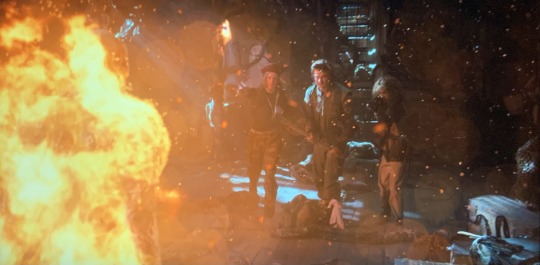
We’re also meant to notice that Robin is the one throwing it. Steve’s throw wasn’t anything this. It’s the angles and timing and we’re just meant to see Robin in a way we weren't meant to see Steve. She’s got the vest, the rolled up sleeves, the red, she’s gay- all of these things are saying Will in season one- because that’s what they’re all trying to do.
But they’re not Will.
1 2 3 4 5 6 7 8 9 10 11 12 13 14 15 16 17 18 19 20 21 22 23 24 25 25.1 25.2 25.3 26 27 28 29 29.1 30 30.1 31 31.1 32 32.1 33 34 35 36 37 (To be edited)
#the lights#will byers#I HAVE WANTED TO TALK ABOUT BALFOUR FOR SO LONG#SHES LITERALLY CASTING FIRE BALL#BUT ITS NOT WORKING#AND ITS CONNECTED TO THE SNOW BALL AND THE FOUR VICTIMS#AND EVERYTHING POINTS TO WILL#NOT BEING THERE#AND MIKE ISNT THERE EITHER#AND THEYRE IMPORTANT (but mostly will)#AND THATS WHY THEY LOST
22 notes
·
View notes
Text
“Ah- excuse me, miss? Are you Charlotte Balfour?”
Dutch had felt...so lost, since that night on the mountain. Directionless. He no longer had any true, solid plan. He was tired of fighting. Tired of running. Tired of...being tired. He didn’t know what to do. For the first time he could remember, he didn’t have even the slightest idea where to go from here.
At first he’d wandered aimlessly. Stayed out of towns, keeping to rural areas in weak disguises. But more and more, he found it difficult to care. Micah kept trying to follow him, to pester him about the damned money- Dutch didn’t even want it anymore. He was about ready to tell him to go get it himself, but he couldn’t bring himself to damn another of his boys to the Goddamned Pinkertons. He needed some foundation. He needed clarity. He needed Hosea. But Hosea wasn’t there, now. He was on his own.
And Dutch's ideas were never as bright without Hosea to perfect them.
As if on autopilot, he found himself approaching the little homestead north of Annesburg. He knew Arthur had visited the building a number of times. Perhaps it would be...beneficial. At least he was doing something, even if he still wasn’t sure it was...right. Or even smart. What if she recognized him? Wanted posters were still out showing his face everywhere from here, to Saint Denis, to Valentine - and even moreso back out west. The heat hadn’t died. Showing himself like this...wasn’t wise.
But he hadn’t been known for being particularly wise of late.

“I... I’m sorry, I don’t mean to bother, you, miss... I’m Archibald Smith. An old friend of mine came up this way not long ago, Arthur? I was hoping to, have a word, I suppose. If you have a moment?”
He spoke slowly, with frequent pauses, as if he wasn’t really sure what he wanted to say. A con man who was out of practice. Part of him just wanted to talk about Arthur - to try and...piece it together in his mind. Figure out where he went wrong. But deep down, he knew. Arthur never went wrong. He did. And it was eating at him every waking moment.
@westpromised hit the starter call!
#westpromised#{ The Dreamer | Dutch van der Linde }#I hope this is okay!!#I was torn between Dutch & Micah for this but throwing MICAH at poor Charlotte just felt cruel jdnDSFDA
10 notes
·
View notes
Text
Is Vince actually prepared to kill Nathan in the woods at the beginning? Or does he just think he hasn't got the power to stand in the way of the Guard's anger?
And what is Vince talking about in the Herald when he says they “tried once, a long time ago” to turn one overlay personality into another? They tried to turn Lucy back to Sarah? Or Sarah back to Veronica? Also, why? Also, how?
Lexie is so fun, “I'd like a heads-up if we're going to get tortured or killed or, made to work in a newspaper” XD
Nathan's confusion outside the Rope Loft at Duke's plan is priceless.
“Is that candy machine going to kill me?” XD actually a very sensible question given the circumstances.
One of the things that sticks in my mind from the commentaries is how Eric Balfour apparently got a round of applause from the crew after his scene when we first seen him as Tyler - well deserved, I'd say.
I love Dwight & The Teagues little domed room of research (presumably The Room that Dave referred to last episode), but I kinda want to know where that is in Haven. It looks like there's a ladder leading down into it, is it supposed to be underground? Like some kind of bomb shelter or something? I mean to me it looks like it's under some railway arch but I don't think Haven has a railway, so.
Love Jennifer's “I will shoot you and I'll probably accidentally hit you in the face so don't come near me” XD I hope I remember that line if I ever have to point a gun at someone ;)
“I left my pen in his leg,” XD more great lines from Jennifer.
I really wish I could tell Jordan where her plans with Wade are going to lead. Just please leave him alone and everyone will be better off.
Lexie's reactions to the Gull (“kinda nautical”) and to Audrey's clothes are priceless, and doubly so when you realise she is actually also Audrey at the time. Insulting her own wardrobe lol
s04e05 - The New Girl
With Nathan's plan to get Audrey to kill him interrupted by the arrival of Lexie, Duke strikes a deal with the Guard designed to stop them killing Nathan on the spot.
Lexie works with Nathan to tackle a possession Trouble, which is ultimately resolved by the Crocker Trouble when the Troubled person uses Duke's possessed body to kill his own and thereby wipes his own Trouble out.
This gives Duke the clue he needs to work out that Lexie is not actually (or not only) Lexie at all ...
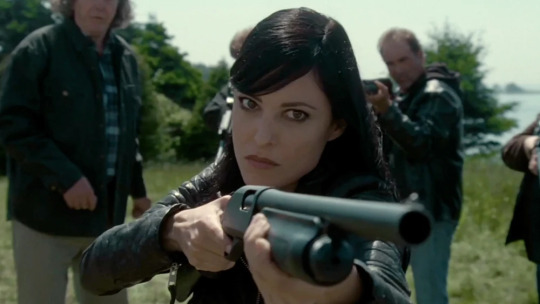
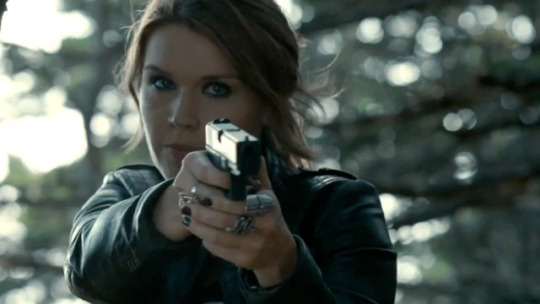
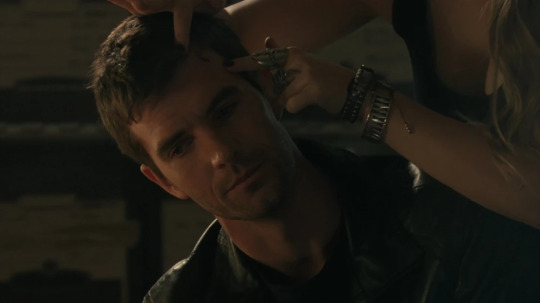
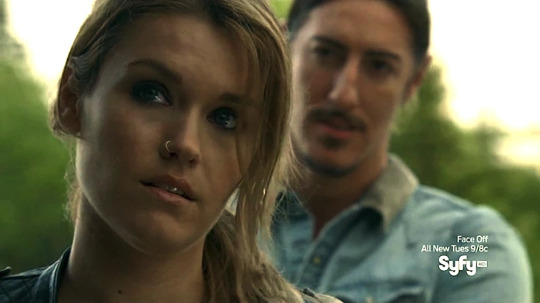
27 notes
·
View notes
Note
Hey my heart✨ I woke up curious today🙈 (but just answer if you want)
About Books:
Top 3 High Lords
Top 3 Ships
Top 3 Women
Top 3 Men
Top 3 Literary Universes
Top 3 Friendships
Top 3 Series
About You
Top 3 Foods
Top 3 Songs
Top 3 Obsessions
Top 3 Wishes
Anaaa 💕💕💕 first i am really sorry i messed this up 🙈 i couldn’t choose my top three and gave you thousands of answer 👀 i tried i really tried (this is shorter version there were more answer before lmao)
Top 3 High Lords:
Eris (is he count? High Lord ish👀 I already killed Beron in my mind so)
Helion
Tarquin
Top 3 Ships (3? Only 3? I can’t! Not enough bestie! I have so many ships!!)
(Oh kay here we go my top 3 ships except Tog)
Gwynriel , Nessian
Zoyalai
Poppycas
Top 3 Women (Again 3 is not enough)
(My top 3 women from each fandom )
Tog > Aelin, Lysandra, Manon,
Acotar > Gwyn, Nesta, Emerie
Grishaverse > Zoya, Genya, Inej
Fbaa> Poppy Balfour, Willa Colyns ❤️🔥, Tawny
Top 3 Men
(my top two fav is easy but i love the rest same )
Dorian Havilliard (of course )
Nikolai Lantsov
Casteel Da’neer, Kieran Contou, Eris Vanserra, Lucien Vanserra, Fenrys Moonbeam, Cassian, Azriel…
Top 3 Literary Universes
Throne of Glass
Harry Potter
Acotar
Top 3 friendships (3? what is 3? Of course i have more)
Valkyrieeesss
Aelin & Lysandra
Casteel & Kieran (also Poppy & Kieran) (oh also Poppy & Tawny)
Inej & Nina (also inej & jesper)( alao Kaz &Jesper) ( Basically all crows lol)
Zoya & Genya (& Alina)
Top 3 Series
Harry Potter
Throne of Glass
Grishaverse/Fbaa (i couldn’t choose)
About meeeee 🧝♀️
Top 3 foods:
Ice cream
Coffee/tea
Cake
i eat so healthy right? kidding of course i am not always eating these🙈 i try to eat healthy but these are my fav
Top 3 songs: ( they are changing every week i can’t answer that)
Top 3 obsession
Morally gray characters 😉😏( @ladyllbookstan Ana you and I 🤝)
Fantasy books with smut 👀 (especially when they have Mermaids, Wings, Faes, Witches… ) ✨
Going for a long walk while talking with someone (usually my twin sis)
Top 3 wishes
I wish i could go to the fantastic universes i read 🌌
Travelling the world 🧳
I wish i have more stable mental health (but you can't always feel amazing so that's ok too 😕)
#i know i know i couldn't answer these like i should 🙈#but i had so fun answering#thank you bestie#ana <3#pls send me more ask bestie
18 notes
·
View notes
Text
Blue Spiders
A/N: This is chapter one in a series! I think it is going to be 3 parts, but if more is requested I do have an outline where I could take it to 10. (Updates on Thursdays)
Pairing: AU Psychiatrist Steve Rogers x Female Reader
Words: 3700
Summary: An interview with a charming doctor leads to more
Warnings: This chapter, mentions of violence and murder, alcohol. I HAVE NOT WARNED FOR EVERYTHING POSSIBLE. PLEASE READ AT YOUR OWN RISK.
Smoothing out your blazer and squaring your shoulders you rose your fist and knocked on the door.
It swung open, taking your breath away at the swiftness of the response. Your jaw dropped for a moment, but you shook the nerves away, always the professional. He was more gorgeous in person with blond hair and blue eyes. The All-American man.
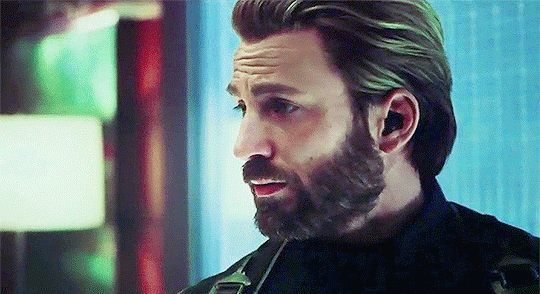
“Dr. Rogers?” You asked.
“So I’ve been called.” He stepped to the side. “Please come in.”
Your eyes went up at the expanse of his office. It had a balcony going around the entire space, floor to ceiling in books. The main floor was open with a huge mahogany desk behind bright windows. There was a sitting area with two chairs, a couch, and a coffee table. On the wall hung a giant painting.
“Is that a Jackson Pollock?” You were surprised to see such a chaotic artist hung in a therapist’s office.
“I know it’s not the traditional calming image you would expect a doctor to hang, but I find it opens people up on the subconscious and allows my patients to see the beauty in madness.” His voice made the hairs on your body rise, so calm and collected.
“Are most of your patients mad?” You looked over your shoulder to see icy blue eyes taking in your face.
“We’re not here to discuss my patients Miss, that is private information.” He wagged a finger in your face before moving toward the sitting area. “I was very clear when I agreed to the interview.”
“Of course, Dr. Rogers.” You followed and sat down opposite him. “I am sure my editor went over the basics with you, but this is for a feature we do monthly on interesting people in the area. There is nothing to worry about, it is not investigative journalism, only a puff piece for our readers looking for human interest stories.”
“Yes, I am still uncertain why I was selected.” The man adjusted his tie that was tucked into a vest. He wore those clothes well. “I fear I am not that interesting.”
“You were instrumental in the capture of the Canary Killer.” You were shocked by his modesty. “The FBI has praised your work and referred to you as an essential asset even though you are not an agent. That alone makes you very fascinating.”
“The Canary Killer.” Dr. Rogers rolled his eyes. “I am not a fan of those nicknames. They devalue the lives of the victims, and criminals are not my expertise.”
“Do you mind?” You reached into your bag and pulled out a tape recorder. “I did not expect to start this soon.”
“Please.” He crossed his legs and his lips turned into a small smirk. “And tell me, why would your readers care about a murderer in Iowa? I am sure they are locally based.”
“Yes. We are out of Washington D.C., readership largely in Maryland and Virginia. The surrounding areas, but a killer like this facinates anyone regardless of region.” As his smile dropped you worried you were coming off too forward. “And, the focus of the piece is on you, not the killings. We want to know your background, your story. I am sure it is more exciting than you give yourself credit for.”
“Your dialect is strange.” He uncrossed his legs and leaned forward. “I can’t quite place where you are from.”
“I moved around a lot as a child.” You looked away from his deep stare. “Is linguistics one of your hobbies? Would you like to expand on that?”
“It is fascinating. Almost as if you have no accent at all. Very unheard of. Tell me, are you trying to disguise your voice?” His teeth ran over his lip, sending a tremble down your spine.
“Doctor, I appreciate the question, but I don’t think I could afford your hourly rate.” You weren’t used to your subjects asking you many questions. “How about you? Where were you born? What drew you to therapy?”
“Right.” His smirk returned. “I was born abroad. My parents passed when I was twelve, I became responsible for my younger sister and believe it or not we snuck in illegally.”
The doctor’s comment on your accent threw you off, especially when he himself was born abroad but had no trace of one. He continued on with his life story and you barely had to ask a question. Everything about the man was fascinating.
“After my years in general surgery I discovered that most of my patients were more concerned with the mental effects and less with the recovery. I enjoyed helping them with any resulting depression or anxiety and realized my love for the blade was second to my love of the mind.” Dr. Rogers glanced toward the window. “People are fascinating and I want to help in any way I can.”
“That is very noble of you.” The jitters you had about his attractiveness were now dwarfed compared to the intensity of his wisdom and compassion. “I know we are running low on time. Is there any personal anecdote you want to include? Wife or kids? Dog?”
His smile brightened the room as he let out a laugh.
“Unfortunately my dedication to my work has left no time for any personal life.” He rose from his seat. “Though since this is a human interest piece, I would say my main hobbies are music and cooking.”
“Wow. Even your hobbies are impressive.” You followed his lead, grabbing your recorder and hitting stop. “You don’t have any unproductive time. Never lose yourself in a television show? Read a pulp novel?”
“I do not enjoy fiction much.” He shrugged. “What is the point when the real world is so interesting?”
“I never thought about it that way.” You smiled. “Thank you for your time. As a courtesy I will send over the article before it is published, not for your approval of course, but your awareness.”
“I am sure it will be as dull as me talking about myself has been.” He held a hand toward the door.
“That is a way to put it, especially since hearing you talk about yourself was the opposite of dull.” You couldn’t find the right words to say, but that did not stop you from speaking. “You see the world through a unique lens and have had very unique experiences. Almost as if, as a species, we are lucky to have you.”
You felt like you should cringe or apologize, but something about the man made you speak your mind.
“And you must be very good at your job, because I felt comfortable saying that to you and I am not even a patient.” You stopped at the door to his office.
The two of you faced each other, his hand went for the knob, but he paused.
“You are not my patient.” Dr. Roger’s eyes glanced over your face, then stopped at your own. The two of you stared at each other and you did not look away as a chill went down your spine, the intensity of the man.
He was about to speak again when a boom landed on the door. You jumped and put your hand to your heart, your adrenaline flaring.
“I’m sorry Dr. Rogers.” The door swung open and a familiar face walked in. “But I need to see you right away.”
The new guest’s voice trailed off as he spotted you. His face scrunched and a look of disgust came over.
“What are you doing here?” Blue eyes glared into your soul.
A smirk crossed your face as you folded your arms.
“Hello Agent Barnes, always a pleasure.” You should have figured he was a patient. “I am writing a human interest piece on Dr. Rogers.”
“You talked to her?” James looked to the doctor. “About me?”
“I didn’t mean to create more problems for you to discuss.” You bit back the urge to fire a crack about his narcissism. “Thank you again Doctor. I will send you the piece in the next week or so.”
You held out your hand and watched as the blonde man shook it with hesitation.
That deep intense stare was gone. Your heart deflated as you left the office, trying to hold your head high and shoulders square. It felt like he was going to ask you out on a date for a moment, one you would have gladly expected.
The cringe you were fighting came forward as you left the swanky office building. Agent Barnes interference or not it was a stupid fantasy. This man was too good for you.
~~
Steve considered his ability to read people top notch. Even though he was the one speaking he spent the past hour studying the journalist and to say she was intriguing was an understatement.
In fact, he was interested enough he was on the verge of asking the woman to dinner.
Bucky’s apparent hatred toward the woman was not expected and Steve found himself mentally recapping the interview to see if he missed something.
Before he could assess the situation she stormed off. Her quip about Bucky being a patient was ruder than he found acceptable.
“You gave an interview to Miranda Balfour?” Bucky gripped his long dark hair as he walked into the office. “What were you thinking?”
“What?” Steve shut the door. “That was not her name.”
“Of course she gave you a fake name.” Bucky scoffed. “I hope you are prepared to have your reputation trashed. Did you think to, google whatever name she gave you?”
“I did and she checked out.” Steve's intrigue for the woman was turning to anger. “Now who are you claiming she is?”
“She is Miranda Balfour. She runs a murder blog, always posting sensational stories. She gave extensive coverage to the Canary Killer.” Bucky ran his hands over his face. “Nothing better than a gossip rag. I’m surprised you haven’t noticed her. She’s always lurking around any local crime scene. Trying to get pictures and interviews like she is a legitimate source. It is disgraceful.”
Steve could feel his body temperature start to rise. He thought about walking over to his desk and sweeping everything off, then taking an axe to the thing. He imagined the wood slowly turning into the face of Miranda Balfour as she took a whack to the head, splintering as easy as a tree stump.
“Well if I have been duped, it is nobody’s fault but my own.” Steve shut the door to his office. “What brings you by so urgently Buck?”
“The New England Butcher.” Bucky shook his head. “I stayed up late last night, going over every murder in the area that even remotely fit his MO.”
“There is one issue off the bat.” Steve took a seat in the chair, knowing Bucky preferred to pace while he spoke. “Lack of sleep.”
“Six murders in three years. Each gruesome in their own way. The randomness of the kills, the victims. It is like we were only able to string them together because he wanted us to.” Bucky stopped. “And that is what caught my attention. What about the ones he doesn’t want us to?”
Bucky sat down and dropped a file on the table. Steve was annoyed at the waste of paper when an email would have sufficed, but he indulged Bucky and picked up the file.
The first photo was of a dismembered man found in a ditch. Steve knew the date off the top of his head, July 2nd 2013. Blake Corenzo. He was a pig of a man.
“That is a murder from 2013. Blake Corenzo. He was stabbed and chopped post mortem.” James glared as Steve looked up, waiting for his punchline. “I think he was the Butcher’s first victim.”
Steve bit back a laugh with expertise.
“The brutality matches. But what was missing?” Steve was curious if the Agent was going to connect the dots.
“Nothing.” He sighed and pressed his hand to his forehead. “Or something we missed. But I have seven more bodies I believe are connected. We know that as killers go on they get lazier, think they are unwatchable, but the Butcher, he is different. We are not going to catch him on a technicality or sloppiness. He is too good.”
Steve did enjoy the flattery.
“We have to find his first kill. It always starts with someone they know. Always.” Bucky had a desperation to his voice.
“So you believe that this Blake Corenzo knew the Butcher?” Steve watched Bucky struggle to connect the dots, not realizing he was the fish on the hook in this game he was not even aware he was playing. “Have you told Anthony Stark?”
“Yes.” The air deflated out of Bucky as he fell back into the couch. “He told me mandatory session with you before I am cleared to return to work.”
“If I check my e-mail will there be one from him? Is that what it will say?” Steve appreciated the protectiveness Tony had for Bucky. In a way it was as if Stark saw Barnes’ brain as a fragile asset. One he was constantly concerned was about to break.
“It will say I can’t go back until you clear me.” Bucky tried to hide the humiliation.
A man in his 30s being controlled by his boss and therapist as if he were a child. Steve recognized something in Bucky, an equality almost. Because Tony Stark’s concern were not without merit. James Buchanan Barnes did have a brain that could operate like no other and if anyone were to catch the Butcher Steve was certain it was the Agent in front of him.
“You are obsessing again.” Steve crossed his legs. “It is not healthy. You are getting too involved. The Butcher hasn’t struck in three months and twice already this year. It’s likely he will not attack for some time. You are trying to create leads.”
“You sound like Tony.” Bucky scoffed and looked away. “When I sleep, I see their faces.”
“Whose faces?” Steve leaned in, unsure what Bucky was going to say next.
“The ones, the ones I didn’t save.” Tears glossed over Bucky’s eyes. “Not the ones who have already died. The ones who will if I don’t stop him. Their faces are blurry but they’re pleading with me.”
“People die every day. You cannot carry that guilt. It will destroy you.” Steve reached for his rx pad.
“I can’t help the people who die every day, but I can help these people. If I can stop the Butcher.” Bucky’s jaw tightened.
“You keep saying ‘I’ when it is a team effort. You are not a superhero. You cannot do this alone.” Steve wrote out a medication.
“I have to since none of you will listen to me. Not Tony, not you.” Bucky rolled his eyes. “Even Natasha told me to give it a rest.”
“Maybe that says something.” Steve handed Bucky the prescription. “That will stop the dreams. Take one before bed and get some sleep.”
“And then what?” Bucky looked up, lips parted.
“And then come and see me in the morning. Once you are rested we will have a conversation about Blake Corenzo and I will talk to Mr. Stark.” Steve watched as relief flooded Bucky’s face.
“Thanks.” He looked at the prescription before shoving it in his pocket and letting out a yawn. “And sorry, for what I said earlier about Miranda. She won’t be able to tarnish your reputation.”
“I am aware. The most salacious detail I gave her is already public knowledge.” Steve rose. “I only regret my own error in judgment. Now get some sleep.”
Bucky nodded as they walked to the door. Steve kept his calm as he let the FBI Agent out.
Then he walked back to the table and picked up the file. He set out the photos of the four crime scenes Bucky wanted to tie to the Butcher.
“Very clever Agent Barnes.” All of them were done by Steve. In a way seeing the photos was like revisiting an old friend.
Corenzo was far from Steve’s first kill though. He had watched the man use a racial slur and a racist imitation at a dry cleaner. Another rude person the world did not need.
Steve flashed back to Miranda’s comment about the human race being lucky to have him. She was right of course, on more levels than she realized. He was purging the world of the disgusting people who did not belong.
After Agent Barnes’ proclamation Miranda Balfour’s name had landed on that list.
~~
Steve was a patient man. He sometimes marked his victims for years before they met their demise.
When he got home, to what his visitor’s refered to as architectural magic, he went straight for the kitchen. It was on the level of any executive chef’s dream.
He would cook tonight. Channel his anger over the reporter, but not before adding her name to his list.
He went to the recipe drawer. It looked more like a filing cabinet, filled with Rolodexes of index cards with carefully printed ingredients and instructions. He had order them online since the entire world had gone digital.
On the rare occasion he had a guest they poked at his old fashioned nature. He remembered the first time he had Bucky over for dinner.
“You live in such a modern house, and appear a very modern man, but that recipe system reminds me of my grandmother.” Bucky laughed as he sipped his wine.
“And I bet your grandmother’s cooking was far superior to your own.” Steve raised as eyebrow as Bucky frowned.
The memory vanished as Steve pulled out the Rolodex he wanted. This one did not have recipes, it was for its original purpose, filled with business card collected over the years.
He grabbed one at random. Donna Chung. He closed his eyes and remembered her behavior, the way she was screaming at her child in the grocery store. The child could have been no more than three and was crying over not being able to drop a quarter in a donation box.
“You get nothing from that. Here I’ll buy you a candy bar instead.”
Steve followed her home that night. Googled the address and the next day walked into her real estate office. He picked up a business card and dropped her in his Rolodex. That was almost eighteen months ago.
She was not a candidate for a butcher murder. Besides, the day left Steve uninspired. But still he set her card to the side.
He picked up an empty one and wrote the name Miranda Balfour, along with the phony one she had given him and the contact e-mail. Then he closed up the Rolodex and put it back in its place.
Steve poured a glass of wine and walked over to his computer. He fired up the laptop.
Grabbing a remote he turned on the fireplace and some music as he sat on his overly plush blue sofa. Calm colors was what his interior designer recommended. He was grateful for that advice. She was someone who brought beauty to the world.
As soon as Steve typed Miranda Balfour into the search her blog popped up first thing. The title was “Miranda’s Macabre Museum”.
Steve rolled his eyes as he went to the first post. It was from two days ago.
Murder
Victim: Lawrence Engle
Death: Stab wounds
Date: April 12th, 1985
Location: Mobile, Alabama
What followed was a summary of the facts. Steve was expecting more of a tattle-tale type scenario. But he did not see anything salacious. If anything it was very matter-of-fact with little insight.
At the end there were links to photos with appropriate warnings and links to sources.
Then there was a section titled editorial.
“Here we go.” Steve readied to read the sordid opinion.
The motive in this murder was money. While the law, for the most part, disregards the motive as important to the trial my long time readers know I disagree. Until we change as a society and value human life over finances we will be doomed to see unnecessary killings as this continue to happen. That does not mean the killer should be pardoned for his crime because society as a whole is at fault. On the contrary. He is part of the problem and should be punished.
Sentence: Death by lethal injection.
“Interesting.” Steve found his mind going back to his initial opinion of Miranda or whatever her name was.
He noticed a search option on her blog and typed in his name. Several posts on Canary victims came up, but he found he was only mentioned in the source articles or the summary.
He did the same for Agent Barnes and saw the results light up. He scrolled the posts for the highlighted name and came across a murder from three years ago.
Editorial: The lead Agent on this case has shown textbook narcissism. His attempt to relate to the killer to solve the crime failed here, because the murder was not about him, but he found a way to make it so. The last victim’s death would have been preventable if Agent Barnes listened to anyone but himself.
“That explains Bucky’s dislike.” Steve shut the laptop and pinched his eyes shut.
When he googled the first name, multiple stories came up that were as she said human interest pieces. Did she lie just to get the interview? Pose as the other woman?
Lie. What difference did it make? She was a liar and had earned a spot in his Rolodex.
This one felt personal though. In a way Steve did not enjoy. She made him feel...comfortable. Or made him feel something. The way her eyes were so inquisitive and she seemed to hang on every work with genuine interest. When in fact he was intentionally trying to bore her.
That would not stand. This woman would not sit in the Rolodex for years. Her time would be shorter. Steve stood up from the couch and went back to the kitchen. He picked up Donna Chung’s card and returned it with the other, instead setting the card he’d just drafted on the counter.
He would start tomorrow.
~~
A/N: Thank you so much for reading! I really appreciate every like/comment/reblog! I haven’t done a series in a long time so I am excited! And if you didn’t figure it out this is....
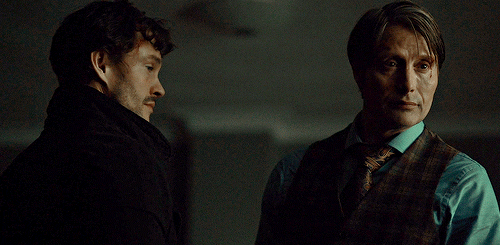
Hannibal AU :).
#Steve rogers x reader#au steve rogers#steve rogers x you#fanfic#fanfiction#marvel fanfic#marvel fanfiction
221 notes
·
View notes